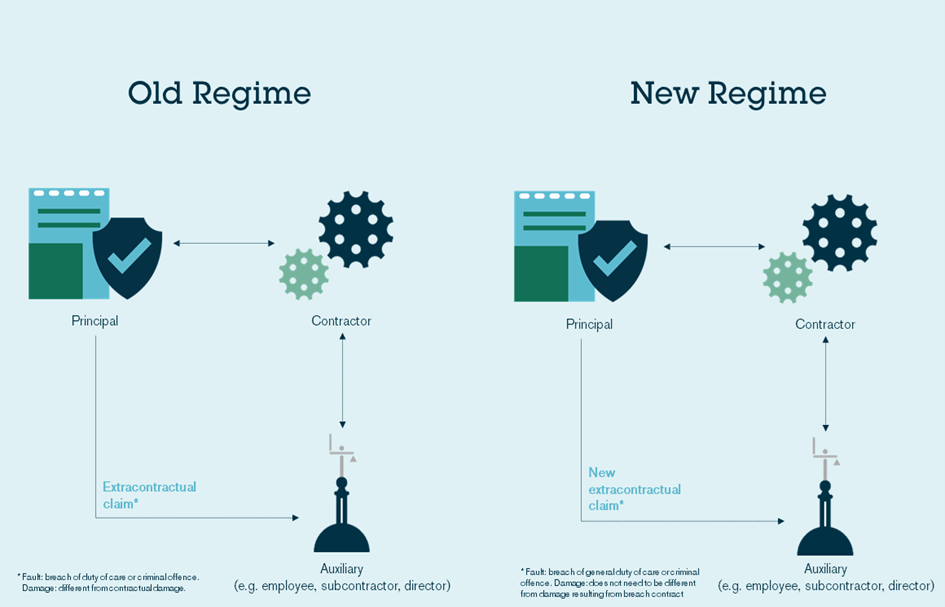What employers should know about Belgium's Civil Code extra-contractual liability rules
Published on 11th September 2024
Businesses will need to address their liability concerns around auxiliary persons, including their employees

The reform of Book 6 of the Civil Code approved by the Belgian House of Representatives in February will have a significant impact on commercial and corporate law – but it will also have a distinct, if more contained, impact on employment law.
The new Book 6 of the Civil Code focuses on "extra-contractual liability" and comprises 55 articles modernising the previous law that consisted of only six articles. The new rules enter into force on 1 January 2025.
Under the Civil Code, the employer is liable vis-à-vis third parties for damage caused to those third parties (contractors) through the fault of their employees during and in connection with the performance of their duties – and without fault on the part of the employer being required.
The new legislation abolishes the principle of quasi-immunity of auxiliary persons, which include employees and directors. The abolition is a crucial aspect of Belgium's reforms of its Civil Code and extra-contractual liability.
What's new?
The new Book VI introduces, notably, the option for an injured party to raise a claim for compensation based on contractual liability against a company or based on extra-contractual liability directly against auxiliary persons.

Source: Osborne Clarke
What does this mean for employees?
As from 1 January 2025, in the case of a fault by a company's employees in the performance of their contractual obligations, the damaged (principal) will have the choice of grounding their claim either on a contractual liability against the company or on an extra-contractual liability directly against its employees who helped performing the main contract closed with the third party.
The damaged third party will have the choice to raise an extracontractual claim towards the employees, even though the damage suffered is no different than the one resulting from the flawed execution of the contract.
Employee protection mechanisms
In case of a direct action against employees based on extra-contractual liability, the employees can invoke some protection mechanisms. The new rules do not affect the contractual provisions governing the liability of auxiliaries nor the protective measures foreseen under special laws, such as legislation on special contracts (for example, rules foreseen in the Employment Contracts Act).
Contractual provisions
Firstly, employees can raise the same defences as the contractor (debtor) to the main contract. The contractual clauses between the principal and the company will continue to apply despite the claim raised against the employee. In other words, the injured party cannot circumvent the contractual clauses; for example, liability exclusion clauses inserted in the main contract with the company by raising a claim against their employee.
Civil liability immunity
Employees can also take advantage of the provisions in their own relationship with your company. It means that employees can invoke their civil liability immunity under the Employment Contracts Act of 3 July 1978 in the event of damage caused to third parties in the performance of their contract. Article 18 of the Employment Contract Act states that the employee's civil liability may only be incurred in the event of gross negligence, intentional negligence or repeated minor negligence (habitual rather than accidental).
It is only in instances of repeated gross negligence, intentional misconduct or minor but repeated negligence that employees could be held civilly liable. However, even if the employee wins their case before a judge, they will not be spared the inconvenience of receiving a summons to appear in person nor the costs associated with legal proceedings.
The new rules allow the parties to the main contract to agree otherwise contractually. Consequently, the extra-contractual liability of employees could be contractually limited or even excluded.
Employee exceptions
An employee cannot, however, invoke the defence mechanisms that are embedded in the main contract and in the sub-contract, in case of either intentional fault of the employee, a fault – even if unintentional – that affects the physical integrity of another person, or the contractual clause removes the essence of the contract and its obligations.
Employer's protection
A company may consider going further than the civil liability immunity foreseen under the Employment Contracts Act. By way of example, your company may consider, in its capacity of employer, to what extent it could foresee adding a contractual limitation or exclusion of an employees' civil liability if they would be targeted by a direct claim by a third party (principal).
This limitation could be contractually foreseen in the main contract with the principal or even in a company policy; for example, in case of gross or minor habitual negligence (unless intentional) if a worker's fault did not harm the physical integrity of a third party. Employers could even consider excluding totally any civil liability for its employees.
Osborne Clarke comment
Next to proactively addressing a business' liability concerns as auxiliary person, contractor or principal, a company could consider a contractual limitation or exclusion of their employees' civil liability in case of a direct claim by a third party (principal) in the contract with the principal.
In order to reassure its employees or future hires, a company could also consider setting up a company policy whereby it undertakes, for example, to provide legal assistance, bearing all costs associated with any legal proceedings brought against its employees personally, except in cases of gross negligence.
As the new rules will apply to all contracts including existing contracts, as of 1 January 2025, employers should also look closely at their contracts portfolio with a view to adding these new clauses.
From an HR management perspective, companies should consider informing their workers on these new rules before 1 January 2025, either proactively or by answering queries. They should let employees know that, in case of a direct claim-based extra-contractual civil liability, they may invoke the protection mechanisms under article 18 of the Employment Contracts Act and the contractual liability limitation or exclusion clauses with the principal creditor, if any.
This is the fourth Insight in our ongoing series exploring aspects of on the new Book 6 of the Civil Code.



